TED演讲—Martin Jacques《了解中国的崛起》(中英对照)
- 格式:doc
- 大小:73.00 KB
- 文档页数:10
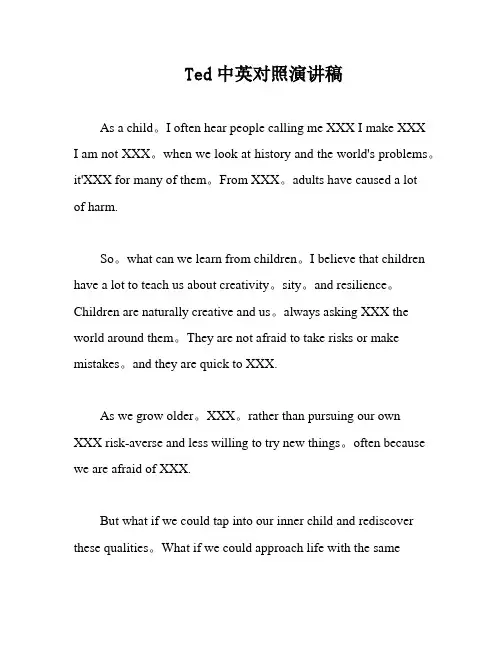
Ted中英对照演讲稿As a child。
I often hear people calling me XXX I make XXX I am not XXX。
when we look at history and the world's problems。
it'XXX for many of them。
From XXX。
adults have caused a lotof harm.So。
what can we learn from children。
I believe that children have a lot to teach us about creativity。
sity。
and resilience。
Children are naturally creative and us。
always asking XXX the world around them。
They are not afraid to take risks or make mistakes。
and they are quick to XXX.As we grow older。
XXX。
rather than pursuing our ownXXX risk-averse and less willing to try new things。
often because we are afraid of XXX.But what if we could tap into our inner child and rediscover these qualities。
What if we could approach life with the samesense of XXX that we had as children。
I believe that doing so could help us live more XXX.So。
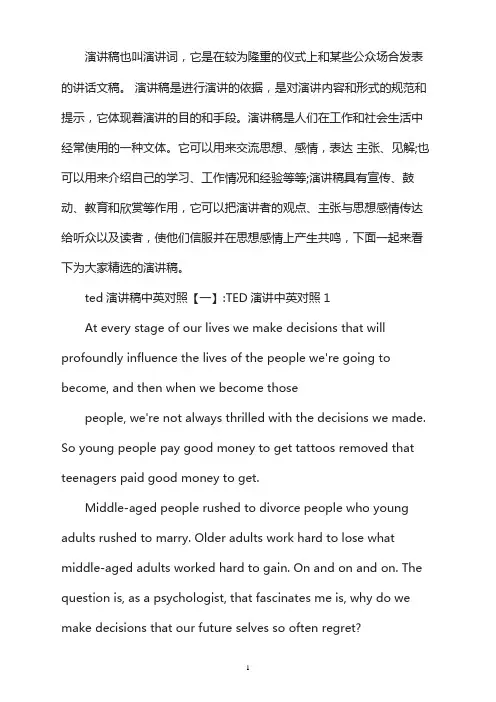
演讲稿也叫演讲词,它是在较为隆重的仪式上和某些公众场合发表的讲话文稿。
演讲稿是进行演讲的依据,是对演讲内容和形式的规范和提示,它体现着演讲的目的和手段。
演讲稿是人们在工作和社会生活中经常使用的一种文体。
它可以用来交流思想、感情,表达主张、见解;也可以用来介绍自己的学习、工作情况和经验等等;演讲稿具有宣传、鼓动、教育和欣赏等作用,它可以把演讲者的观点、主张与思想感情传达给听众以及读者,使他们信服并在思想感情上产生共鸣,下面一起来看下为大家精选的演讲稿。
ted演讲稿中英对照【一】:TED演讲中英对照1At every stage of our lives we make decisions that will profoundly influence the lives of the people we're going to become, and then when we become thosepeople, we're not always thrilled with the decisions we made. So young people pay good money to get tattoos removed that teenagers paid good money to get.Middle-aged people rushed to divorce people who young adults rushed to marry. Older adults work hard to lose what middle-aged adults worked hard to gain. On and on and on. The question is, as a psychologist, that fascinates me is, why do we make decisions that our future selves so often regret?在我们生命的每个阶段,我们都会做出一些决定,这些决定会深刻影响未来我们自己的生活,当我们成为未来的自己时,我们并不总是对过去做过的决定感到高兴。
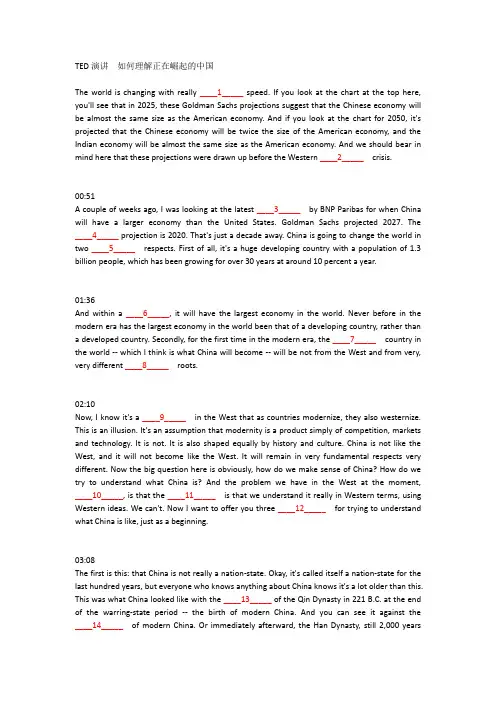
TED演讲如何理解正在崛起的中国The world is changing with really ____1_____speed. If you look at the chart at the top here, you'll see that in 2025, these Goldman Sachs projections suggest that the Chinese economy will be almost the same size as the American economy. And if you look at the chart for 2050, it's projected that the Chinese economy will be twice the size of the American economy, and the Indian economy will be almost the same size as the American economy. And we should bear in mind here that these projections were drawn up before the Western ____2_____crisis.00:51A couple of weeks ago, I was looking at the latest ____3_____ by BNP Paribas for when China will have a larger economy than the United States. Goldman Sachs projected 2027. The ____4_____ projection is 2020. That's just a decade away. China is going to change the world in two ____5_____respects. First of all, it's a huge developing country with a population of 1.3 billion people, which has been growing for over 30 years at around 10 percent a year.01:36And within a____6_____, it will have the largest economy in the world. Never before in the modern era has the largest economy in the world been that of a developing country, rather than a developed country. Secondly, for the first time in the modern era, the ____7_____country in the world -- which I think is what China will become -- will be not from the West and from very, very different ____8_____roots.02:10Now, I know it's a ____9_____in the West that as countries modernize, they also westernize. This is an illusion. It's an assumption that modernity is a product simply of competition, markets and technology. It is not. It is also shaped equally by history and culture. China is not like the West, and it will not become like the West. It will remain in very fundamental respects very different. Now the big question here is obviously, how do we make sense of China? How do we try to understand what China is? And the problem we have in the West at the moment, ____10_____, is that the ____11_____is that we understand it really in Western terms, using Western ideas. We can't. Now I want to offer you three ____12_____for trying to understand what China is like, just as a beginning.03:08The first is this: that China is not really a nation-state. Okay, it's called itself a nation-state for the last hundred years, but everyone who knows anything about China knows it's a lot older than this. This was what China looked like with the ____13_____ of the Qin Dynasty in 221 B.C. at the end of the warring-state period --the birth of modern China. And you can see it against the ____14_____of modern China. Or immediately afterward, the Han Dynasty, still 2,000 yearsago. And you can see already it ____15_____most of what we now know as Eastern China, which is where ____16_____ of Chinese lived then and live now.03:45Now what is ____17_____about this is, what gives China its sense of being China, what gives the Chinese the sense of what it is to be Chinese, comes not from the last hundred years, not from the nation-state period, which is what happened in the West, but from the period, if you like, of the civilization-state. I'm thinking here, for example, of customs like ____18_____, of a very distinctive notion of the state, likewise, a very ____19_____notion of the family, social relationships like guanxi, Confucian values and so on. These are all things that come from the period of the civilization-state. In other words, China, unlike the Western states and most countries in the world, is shaped by its sense of civilization, its existence as a civilization-state, rather than as a nation-state. And there's one other thing to add to this, and that is this: Of course we know China's big, huge, ____20_____and geographically, with a population of 1.3 billion people. What we often aren't really aware of is the fact that China is extremely diverse and very pluralistic, and in many ways very ____21_____. You can't run a place on this scale simply from Beijing, even though we think this to be the case. It's never been the case.05:10So this is China, a civilization-state, rather than a nation-state. And what does it mean? Well, I think it has all sorts of profound implications. I'll give you two quick ones. The first is that the most important political value for the Chinese is unity, is the ____22_____of Chinese civilization. You know, 2,000 years ago, Europe: ____23_____-- the fragmentation of the Holy Roman Empire. It divided, and it's remained ____24_____ever since. China, over the same time period, went in exactly the ____25_____direction, very painfully holding this huge civilization, civilization-state, together.。
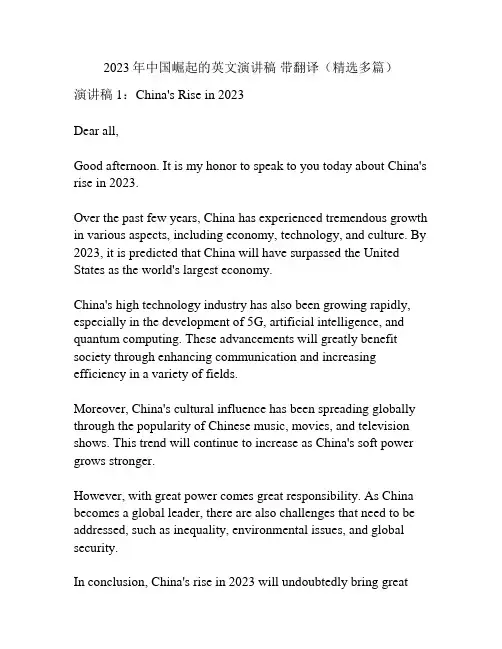
2023年中国崛起的英文演讲稿带翻译(精选多篇)演讲稿1:China's Rise in 2023Dear all,Good afternoon. It is my honor to speak to you today about China's rise in 2023.Over the past few years, China has experienced tremendous growth in various aspects, including economy, technology, and culture. By 2023, it is predicted that China will have surpassed the United States as the world's largest economy.China's high technology industry has also been growing rapidly, especially in the development of 5G, artificial intelligence, and quantum computing. These advancements will greatly benefit society through enhancing communication and increasing efficiency in a variety of fields.Moreover, China's cultural influence has been spreading globally through the popularity of Chinese music, movies, and television shows. This trend will continue to increase as China's soft power grows stronger.However, with great power comes great responsibility. As China becomes a global leader, there are also challenges that need to be addressed, such as inequality, environmental issues, and global security.In conclusion, China's rise in 2023 will undoubtedly bring greatopportunities as well as challenges. It is our responsibility as a global community to work together to ensure that the benefits are shared among all countries and that challenges are addressed through collaboration and cooperation.Thank you for attention.亲爱的各位,下午好。
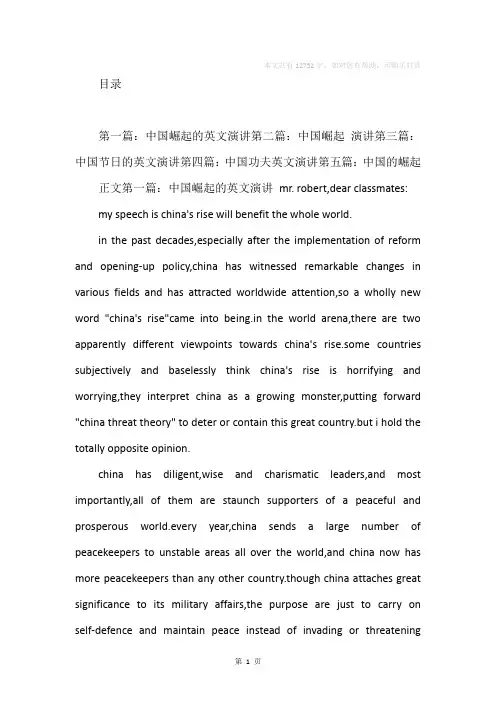
本文共有12752字,如对您有帮助,可购买打赏目录第一篇:中国崛起的英文演讲第二篇:中国崛起演讲第三篇:中国节日的英文演讲第四篇:中国功夫英文演讲第五篇:中国的崛起正文第一篇:中国崛起的英文演讲mr. robert,dear classmates:my speech is china's rise will benefit the whole world.in the past decades,especially after the implementation of reform and opening-up policy,china has witnessed remarkable changes in various fields and has attracted worldwide attention,so a wholly new word "china's rise"came into being.in the world arena,there are two apparently different viewpoints towards china's rise.some countries subjectively and baselessly think china's rise is horrifying and worrying,they interpret china as a growing monster,putting forward "china threat theory" to deter or contain this great country.but i hold the totally opposite opinion.china has diligent,wise and charismatic leaders,and most importantly,all of them are staunch supporters of a peaceful and prosperous world.every year,china sends a large number of peacekeepers to unstable areas all over the world,and china now has more peacekeepers than any other country.though china attaches great significance to its military affairs,the purpose are just to carry on self-defence and maintain peace instead of invading or threateningothers.as to economy and trade,this year,china has surpassed japan in economic volume,ranking second merely after the us.china has became an important export market not only for its neighboring countries,including the republic of korea and japan,but also the eu and the us. especially after the financial crisis occuring in xx,china has been leading global economic recovery.in the meantime,china is a responsible country with a rare sense of responsibility to all humanity.its aid to developing countries has been unconditional,and on the other hand, china waived many debts of scores of least developed countries from africa, asia, the caribbean and the south pacific.china is a peace-loving country,but that doesn't mean to gain peace and stability,it will give up necessary principles.it firmly upholds its national core interests.when it comes to sovereignty and territorial integrity,china will not yield or compromise,they are so holy that no country can interfere.china knows perfectly that it can't develop in isolation from the rest of the world,so china is more than happy to work with any countries who are willing to adhere to political trust and mutual cooperation.china actively supports solving disputes through dialogue and negotiation in a peaceful way,and it will unswervingly follow the path of peaceful development and stay open and inclusive.our leaders have beenreiterating we don't seek hegemony now,and we won't do it either even when china is a developed country.in a word,china's rise is sure to be a good chance for a healthier and richer world.罗伯特,亲爱的同学们:我的讲话是中国的崛起将造福于整个世界。
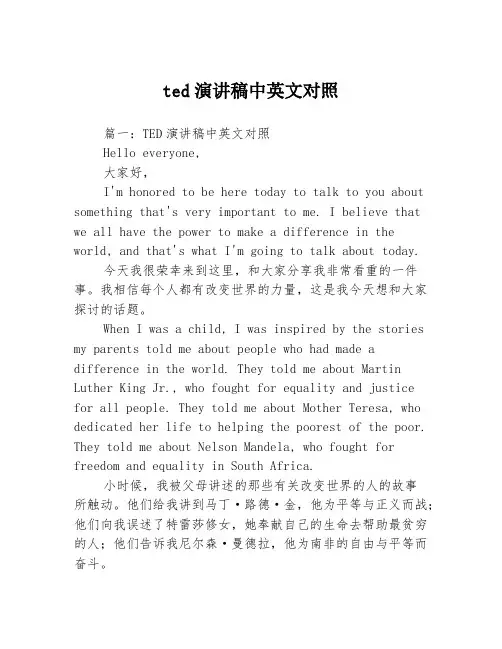
ted演讲稿中英文对照篇一:TED演讲稿中英文对照Hello everyone,大家好,I'm honored to be here today to talk to you about something that's very important to me. I believe that we all have the power to make a difference in the world, and that's what I'm going to talk about today.今天我很荣幸来到这里,和大家分享我非常看重的一件事。
我相信每个人都有改变世界的力量,这是我今天想和大家探讨的话题。
When I was a child, I was inspired by the stories my parents told me about people who had made a difference in the world. They told me about Martin Luther King Jr., who fought for equality and justicefor all people. They told me about Mother Teresa, who dedicated her life to helping the poorest of the poor. They told me about Nelson Mandela, who fought for freedom and equality in South Africa.小时候,我被父母讲述的那些有关改变世界的人的故事所触动。
他们给我讲到马丁·路德·金,他为平等与正义而战;他们向我误述了特雷莎修女,她奉献自己的生命去帮助最贫穷的人;他们告诉我尼尔森·曼德拉,他为南非的自由与平等而奋斗。
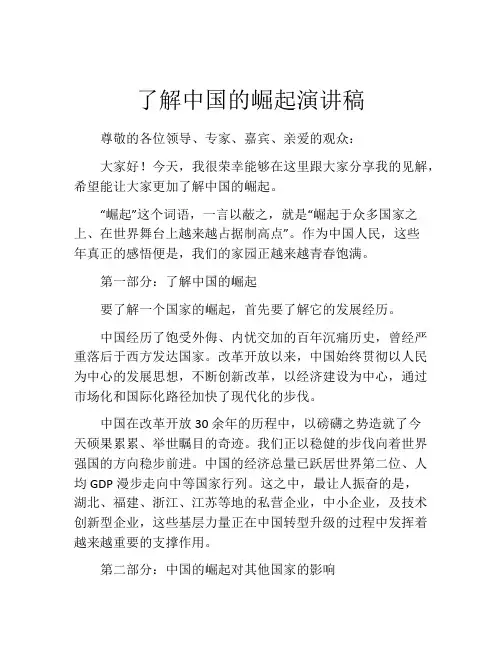
了解中国的崛起演讲稿尊敬的各位领导、专家、嘉宾、亲爱的观众:大家好!今天,我很荣幸能够在这里跟大家分享我的见解,希望能让大家更加了解中国的崛起。
“崛起”这个词语,一言以蔽之,就是“崛起于众多国家之上、在世界舞台上越来越占据制高点”。
作为中国人民,这些年真正的感悟便是,我们的家园正越来越青春饱满。
第一部分:了解中国的崛起要了解一个国家的崛起,首先要了解它的发展经历。
中国经历了饱受外侮、内忧交加的百年沉痛历史,曾经严重落后于西方发达国家。
改革开放以来,中国始终贯彻以人民为中心的发展思想,不断创新改革,以经济建设为中心,通过市场化和国际化路径加快了现代化的步伐。
中国在改革开放30余年的历程中,以磅礴之势造就了今天硕果累累、举世瞩目的奇迹。
我们正以稳健的步伐向着世界强国的方向稳步前进。
中国的经济总量已跃居世界第二位、人均GDP漫步走向中等国家行列。
这之中,最让人振奋的是,湖北、福建、浙江、江苏等地的私营企业,中小企业,及技术创新型企业,这些基层力量正在中国转型升级的过程中发挥着越来越重要的支撑作用。
第二部分:中国的崛起对其他国家的影响中国的崛起必然对其他国家产生影响,而这种影响则体现在各个领域。
在经济领域,中国的崛起引领全球格局的变化,扩大了世界市场,为全球经济发展做出了重要贡献。
中国对其他国家的投资和经济合作,为这些国家提供了更多的机会和资源,促进了全球经济的共同繁荣。
在政治领域,中国积极参与国际组织和国际事务,担任联合国维和任务最多的常任理事国,向国际社会表明了自己的责任和担当,也为维护世界和平做出了贡献。
在文化领域,中国多层次地参与文化交流活动,传播中国文化,促进民族文化的多元共存。
同时,中国也学习借鉴外国文化,推动了文化的多元化发展。
第三部分:我对中国崛起的看法和理解对中国崛起,我们应该有清醒的认识,看到其中的机遇和挑战。
首先,我们要看到机遇。
中国的崛起将带来更多的发展机会,这是其他国家不可忽视的现实。
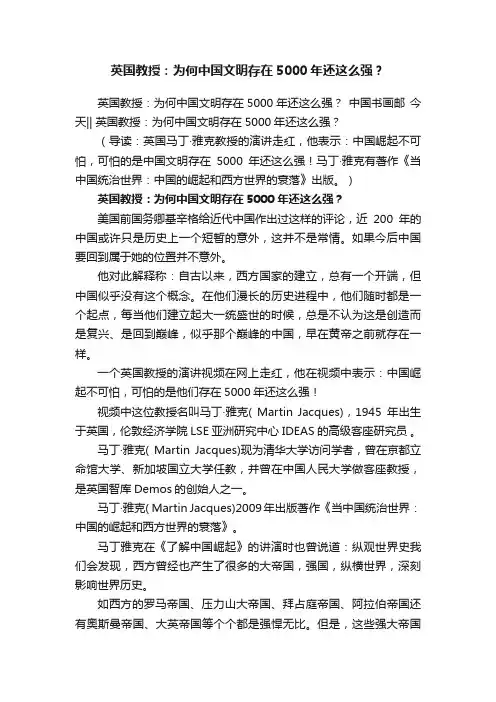
英国教授:为何中国文明存在5000年还这么强?英国教授:为何中国文明存在5000年还这么强?中国书画邮今天|| 英国教授:为何中国文明存在5000年还这么强?(导读:英国马丁·雅克教授的演讲走红,他表示:中国崛起不可怕,可怕的是中国文明存在5000年还这么强!马丁·雅克有著作《当中国统治世界:中国的崛起和西方世界的衰落》出版。
)英国教授:为何中国文明存在5000年还这么强?美国前国务卿基辛格给近代中国作出过这样的评论,近200年的中国或许只是历史上一个短暂的意外,这并不是常情。
如果今后中国要回到属于她的位置并不意外。
他对此解释称:自古以来,西方国家的建立,总有一个开端,但中国似乎没有这个概念。
在他们漫长的历史进程中,他们随时都是一个起点,每当他们建立起大一统盛世的时候,总是不认为这是创造而是复兴、是回到巅峰,似乎那个巅峰的中国,早在黄帝之前就存在一样。
一个英国教授的演讲视频在网上走红,他在视频中表示:中国崛起不可怕,可怕的是他们存在5000年还这么强!视频中这位教授名叫马丁·雅克( Martin Jacques),1945年出生于英国,伦敦经济学院LSE亚洲研究中心IDEAS的高级客座研究员。
马丁·雅克( Martin Jacques)现为清华大学访问学者,曾在京都立命馆大学、新加坡国立大学任教,并曾在中国人民大学做客座教授,是英国智库Demos的创始人之一。
马丁·雅克( Martin Jacques)2009年出版著作《当中国统治世界:中国的崛起和西方世界的衰落》。
马丁雅克在《了解中国崛起》的讲演时也曾说道:纵观世界史我们会发现,西方曾经也产生了很多的大帝国,强国,纵横世界,深刻影响世界历史。
如西方的罗马帝国、压力山大帝国、拜占庭帝国、阿拉伯帝国还有奥斯曼帝国、大英帝国等个个都是强悍无比。
但是,这些强大帝国在衰弱后基本上都是飞灰湮灭后世很难再崛起了。
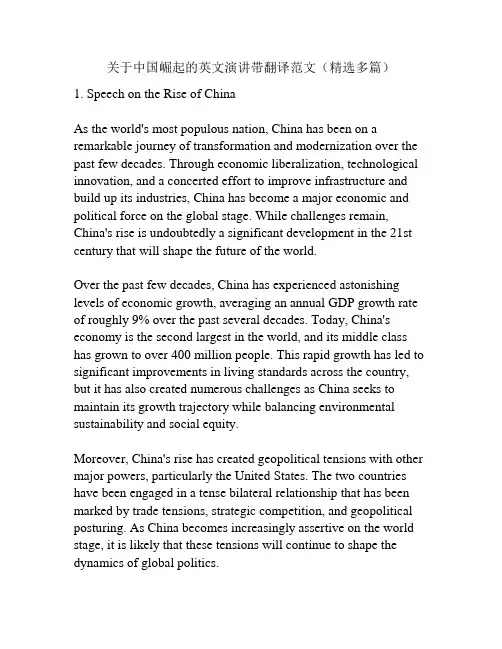
关于中国崛起的英文演讲带翻译范文(精选多篇)1. Speech on the Rise of ChinaAs the world's most populous nation, China has been on a remarkable journey of transformation and modernization over the past few decades. Through economic liberalization, technological innovation, and a concerted effort to improve infrastructure and build up its industries, China has become a major economic and political force on the global stage. While challenges remain, China's rise is undoubtedly a significant development in the 21st century that will shape the future of the world.Over the past few decades, China has experienced astonishing levels of economic growth, averaging an annual GDP growth rate of roughly 9% over the past several decades. Today, China's economy is the second largest in the world, and its middle class has grown to over 400 million people. This rapid growth has led to significant improvements in living standards across the country, but it has also created numerous challenges as China seeks to maintain its growth trajectory while balancing environmental sustainability and social equity.Moreover, China's rise has created geopolitical tensions with other major powers, particularly the United States. The two countries have been engaged in a tense bilateral relationship that has been marked by trade tensions, strategic competition, and geopolitical posturing. As China becomes increasingly assertive on the world stage, it is likely that these tensions will continue to shape the dynamics of global politics.China's rise also has implications for the international system more broadly. As a major power, China is becoming increasingly influential in shaping global governance, from climate change tothe regulation of emerging technologies. The rise of China, along with other emerging powers, is challenging the dominance of the traditional actors in the international system, and there is an urgent need to rethink how global governance can be reformed to accommodate the new realities of the 21st century.In conclusion, China's rise is one of the defining developments of the 21st century. While it brings with it numerous opportunities, it also poses significant challenges for China and the rest of the world. It is up to global leaders to manage these challenges effectively and to ensure that the rise of China is ultimately a force for good in the world.中文翻译:作为世界上人口最多的国家,中国在过去几十年中经历了一次引人注目的转型和现代化之旅。
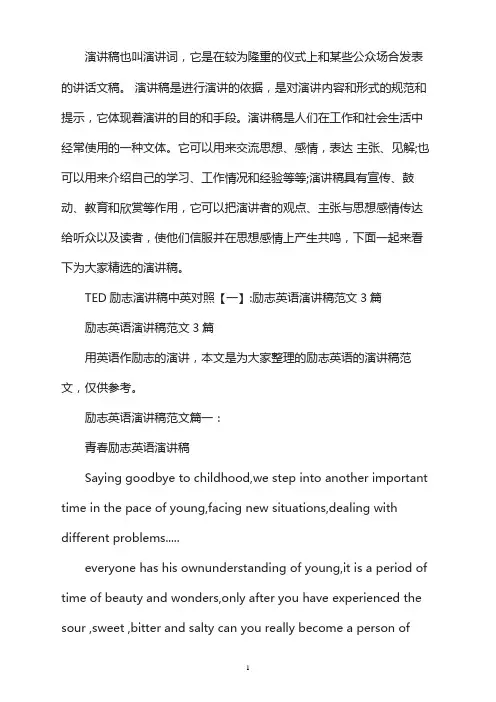
演讲稿也叫演讲词,它是在较为隆重的仪式上和某些公众场合发表的讲话文稿。
演讲稿是进行演讲的依据,是对演讲内容和形式的规范和提示,它体现着演讲的目的和手段。
演讲稿是人们在工作和社会生活中经常使用的一种文体。
它可以用来交流思想、感情,表达主张、见解;也可以用来介绍自己的学习、工作情况和经验等等;演讲稿具有宣传、鼓动、教育和欣赏等作用,它可以把演讲者的观点、主张与思想感情传达给听众以及读者,使他们信服并在思想感情上产生共鸣,下面一起来看下为大家精选的演讲稿。
TED励志演讲稿中英对照【一】:励志英语演讲稿范文3篇励志英语演讲稿范文3篇用英语作励志的演讲,本文是为大家整理的励志英语的演讲稿范文,仅供参考。
励志英语演讲稿范文篇一:青春励志英语演讲稿Saying goodbye to childhood,we step into another important time in the pace of young,facing new situations,dealing with different problems.....everyone has his ownunderstanding of young,it is a period of time of beauty and wonders,only after you have experienced the sour ,sweet ,bitter and salty can you really become a person ofsignificance.thre time of young is limitted,it may pass by without your attention,and when you discover what has happened ,it is always too late.grasping the young well means a better time is waiting for you in the near future,or the situation may be opposite .having a view on these great men in the history of hunmanbeing,they all made full use of their youth time ,to do things that are useful to society,to the whole mankind,and as a cosquence ,they are remembered by latergenerations,admired by everyone.so do something in the time of young,although you may not get achievements as these greatmen did ,though not for the whole word,just for youeself,for those around!the young is just like blooming flowers,they are so beautiful when blooming,they make people feel happy,but with time passing by,after they withers ,moet people think they are ugly.and so it is the same with young,we are enthusiastic when we are young,then we may lose ourpassion when getting older and older.so we must treasureit ,don't let the time pass by .励志英语演讲稿范文篇二:good evening , ladies and gentlemen . i am joy and glad to give you a speech about stress , yes , just the topic you see on the screen.psychologist tell us that stress is a state of worry caused by the problem of living , such as too much work or study , heavy responsibilities , and quickened pace of life .statistics show that stress comes from every detail in our life . financial problems , poor health , being laid off may be the stress that most adults now suffering . as students in the university , we are also under our special stress . while study , having to take various tests and submit a project against a deadline may put a great pressure on us . and the things make us felt stressed may be our parents's greater expectations on us than we could reach . later , when we are likely to graduate , some other problems will also annoy us . i think we will worry a lot about our ability to compete in the job market and how we can best use what we've learned at college in our future job .励志英语演讲稿范文篇三:ladies and gentlemen , good afternoon! i'm very glad to stand here and give you a short speech. today my topic is ―youth‖. i hope you will like it , and found the importance in your youth so that more cherish it.first i want to ask you some questions:1、do you know what is youth?2、how do you master your youth?youthyouth is not a time of life, it is a state of mind ; it is not rosy cheeks , red lips and supple knees, it is a matter of the emotions : it is the freshness ; it is the freshness of the deep springs of life .youth means a temperamental predominance of courage over timidity of the appetite , for adventure over the love of ease. this often exists in a man of 60 more than a boy of 20 . nobody grows old merely by a number of years . we grow old by deserting our ideals.years wrinkle the skin , but to give up enthusiasm wrinkles the soul . worry , fear , self –distrust bows the heart and turns the spirit back to dust .whether 60 of 16 , there is in every human being ?s heart the lure of wonders, the unfailing childlike appetite of what's next and the joy of the game of living . in the center of your heart and my heart there's a wireless station : so long as it receives messages of beauty , hope ,cheer, courage and power from men and from the infinite, so long as you are young .when the aerials are down , and your spirit is covered with snows ofcynicism and the ice of pessimism, then you are grownold ,even at 20 , but as long as your aerials are up ,to catch waves of optimism , there is hope you may die young at 80.thank you!TED励志演讲稿中英对照【二】:TED演讲中英对照1At every stage of our lives we make decisions that will profoundly influence the lives of the people we're going to become, and then when we become thosepeople, we're not always thrilled with the decisions we made. So young people pay good money to get tattoos removed that teenagers paid good money to get.Middle-aged people rushed to divorce people who young adults rushed to marry. Older adults work hard to lose what middle-aged adults worked hard to gain. On and on and on. The question is, as a psychologist, that fascinates me is, why do we make decisions that our future selves so often regret?在我们生命的每个阶段,我们都会做出一些决定,这些决定会深刻影响未来我们自己的生活,当我们成为未来的自己时,我们并不总是对过去做过的决定感到高兴。
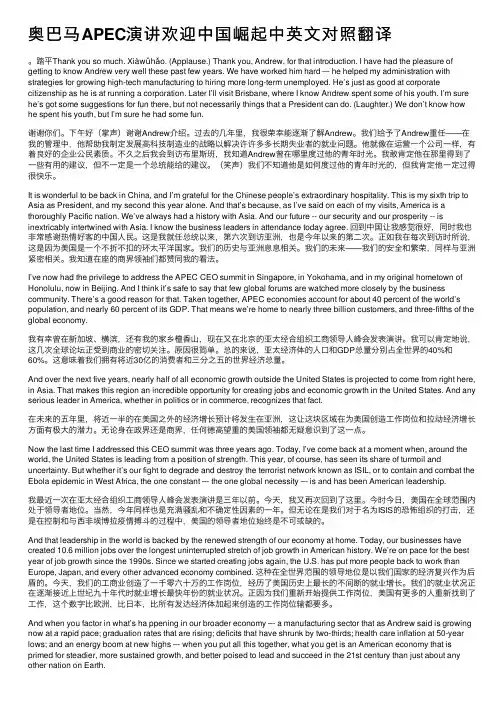
奥巴马APEC演讲欢迎中国崛起中英⽂对照翻译。
踏平Thank you so much. Xiàwǔhǎo. (Applause.) Thank you, Andrew, for that introduction. I have had the pleasure of getting to know Andrew very well these past few years. We have worked him hard –- he helped my administration with strategies for growing high-tech manufacturing to hiring more long-term unemployed. He’s just as good at corporate citizenship as he is at running a corporation. Later I’ll visit Brisbane, where I know Andrew spent some of his youth. I’m sure he’s got some suggestions for fun there, but not necessarily things that a President can do. (Laughter.) We don’t know how he spent his youth, but I’m sure he had some fun.谢谢你们。
下午好(掌声)谢谢Andrew介绍。
过去的⼏年⾥,我很荣幸能逐渐了解Andrew。
我们给予了Andrew重任——在我的管理中,他帮助我制定发展⾼科技制造业的战略以解决许许多多长期失业者的就业问题。
他就像在运营⼀个公司⼀样,有着良好的企业公民素质。
不久之后我会到访布⾥斯班,我知道Andrew曾在哪⾥度过他的青年时光。
关于中国的ted英语演讲精选TED演讲是全球范围内知名的公开演讲活动,其中也涵盖了许多关于中国的演讲,这些演讲向世界介绍了中国的发展、文化、历史、社会等各个方面。
下面是关于中国的TED英语演讲精选的文章:TED Talks on China: Exploring the Land of Opportunities and Cultural RichesChina, a nation with a rich history spanning over thousands of years, has experienced a rapid transformation that has captured the world's attention. TED, a platform known for its thought-provoking talks, has provided a platform for many individuals to share their insights about this fascinating country. In this article, we will delve into a curated selection of TED Talks that provide unique perspectives on China's development, culture, and societal challenges.1. "China's New Normal" by Vishakha DesaiVishakha Desai, an expert in Asian art and culture, explores the shift in China's socio-economic landscape post the 2008 financial crisis. Desai sheds light on the country's efforts to rebalance its economy, tackle environmental issues, and address social disparities. By analyzing these changes, she offers a compelling vision of China's future and its impact on the international stage.2. "The Chinese zodiac, explained" by ShaoLan HsuehLanguage and cultural enthusiast ShaoLan Hsueh introduces the audience to the fascinating world of Chinese zodiac signs, unveiling thesymbolism and historical significance behind each animal representation. Through her witty and engaging talk, Hsueh provides insights into how understanding the Chinese zodiac can deepen our appreciation for Chinese culture and enhance cross-cultural communication.3. "What Does It Mean to Be Both Chinese and American?" by Sue BryceWith a personal journey as the backdrop, Sue Bryce narrates her experiences growing up as a Chinese American and the challenges she faced in reconciling her dual identity. Her talk touches upon the complexities of cultural assimilation, the significance of heritage, and the importance of embracing diversity. Bryce's story sheds light on the unique perspectives of individuals grappling with their cultural roots in a globalized world.4. "The Rise of China and Its Global Impact" by Martin JacquesMartin Jacques, a renowned author and academic, delves into the multifaceted rise of China and its implications for the global order. By examining China's historical trajectory, cultural values, and growing influence, Jacques offers a fresh perspective on the country's ascent. His talk prompts reflection on China's place in the world and the challenges it presents to traditional Western hegemony.5. "China's Left-Behind Children" by Joanna ChiuJournalist Joanna Chiu sheds light on the struggles faced by China's left-behind children – those who are left in rural areas while their parents seek better economic opportunities in cities. Through compelling stories and statistics, Chiu highlights the emotional, societal, and educational challengesfaced by these children. Her talk urges for greater attention to be paid to this significant issue and offers potential solutions.6. "The Power of the Chinese Internet" by Eric X. LiEric X. Li, a political scientist, explores the dynamic landscape of China's internet and its impact on the country's political and social sphere. Li argues that China's unique approach to internet governance challenges Western notions of freedom and democracy and offers an alternative narrative. His talk invites the audience to reevaluate their preconceived notions about the internet and understand its role in shaping societies.China's TED Talks offer a window into the country's diverse and evolving landscape. Through these talks, we gain deeper insights into China's economic reforms, cultural heritage, identity struggles, global influence, societal issues, and technological advancements. The speakers' perspectives challenge our assumptions and broaden our understanding of this multifaceted nation. As China continues to shape global affairs, these TED Talks provide a valuable resource for anyone seeking a nuanced understanding of this complex and fascinating country.。
《中国崛起的英文演讲》摘要:演讲三国节日英演讲四国功夫英演讲五国崛起更多相关国崛起英演讲 r rbr,r l " r ll b l rl ,ll r l rr g l, rrkbl gvr l r rl , ll r "" r" bg rl r,r r rl r v r " r r bvl bll k " r rrg rrg, rr grg r,g rr " r r" r r gr rb l ll lg, r lr, rl,ll rrr l rr rlvr r, lrg br kr bl r ll vr rl, r kr r rg gr g lr r, r r rr l vg r rg r r, r, r vl,rkg rl r b r xr rk l r gbrg r,lg rbl kr ,b l ll r l r rg xx, b lg glbl rvr , rbl r rr rbl ll vlg r b l...35更多顶部国崛起英演讲二国崛起演讲三国节日英演讲四国功夫英演讲五国崛起更多相关国崛起英演讲 r rbr,r l " r ll b l rl ,ll r l rr g l, rrkbl g vr l r rl , ll r "" r" bg rl r,r r rl r v r " r r bvl bll k " r rrg rrg, rr grg r,g rr " r r" r r gr rb l ll lg, r lr, rl,ll r rr l rr rlvr r, lrg br kr bl r ll vr rl, r kr r rg gr g lr r, r r rr l vg r rg r r, r, r vl,rkg rl r b r xr rk l r gbrg r,lg rbl kr ,b l ll r l r rg xx, b lg glbl rvr , rbl r rr rbl ll vlg r b l, r , v b r l vl r r r, , rbb lvg r,b " g bl, ll gv r rl rl l l r r vrg rrrl gr, ll l r r, r l r rr k rl " vl l r r rl, r rk r r llg r ll r l r vl r lvg rg lg g l , ll rvgl ll l vl lvr lr v b rrg " k g , " r v vl r r," r r b g r lr rr rl罗伯特亲爱学们我讲话是国崛起将造福整世界几十年特别是改革和实施开放政策国各领域发生了显着变化并吸引了全世界关因全新单词“国崛起”正式bg世界舞台上有有两明显不r国r国观认主观和bll国崛起是令人震惊和担心他们释国不断增长怪物提出“国威胁论”以阻止或遏制这伟rb我拥有完全相反见国有勤奋智慧和魅力领导人重要是他们都是和平与繁荣坚定支持者rlvr年国将所有世界不稳定地区维和人员对量和国现有更多维和部队比任何其他rg国十分重视军事事其目只是进行卫和维护而不是侵略或威胁他人和平至济贸易今年以国济总量已超日位居二只已不仅成周边国包括韩国和日重要出口市场也是欧盟和美国特别是金融危机发生xx年国已领先全球济rvr与国是罕见责任识所有对发展国援助责任国已被无条件另方面国放弃对非洲亚洲加勒比和南太平洋地区几十国许多不发达国债国是爱和平国但是这并不味着获得和平与稳定将放弃其必要rl坚维护国核心r涉及到主权和领土完整国不会屈或妥协他们是如神圣任何国都不能干涉国明知它不能孤立地发展从世界其他地区所以国比任何国感到高兴谁愿要坚持政治信和相r积极支持通对话和谈判争端工作以和平方式将坚定不移地走和平发展道路保持开放和lvr领导人直重申我们现不称霸我们不会做它要么即使国是发达国总国崛起是定会更健康和更丰富世界成很机会二国崛起演讲你们是否还记得那辉煌灿烂华明曾傲然世界那地物博国屹立世界东方?你们是否还记得我们国孱弱候帝国侵略者铁蹄无情践踏着我们美丽山河?3你们是否还记得那曾是国附属贫乏国日开始觊觎国以武力侵略国而我们这曾泱泱国也只能任人欺侮?而你们是否又看到了看到了这沉睡国醒了龙传人再次向世界昭示我们伟国民族是不可能被摧毁不可能被战胜如今她又起了学们我们要做就是齐记住我们曾有辉煌和屈辱实现华夏明伟复兴国头威猛雄狮虽然他曾满目创伤虽然他曾疲惫不堪但是今天他苏醒了他再崛起他豪迈地走向世界向人们展示他王者风让世界拥抱了他??我们新世纪门楦xà蓦然回首看到崛起国又该体味怎样豪发出怎样感慨呢?30多年改革开放,国从落农业社会发展成现代商业社会,并着手开拓具有(请支持国特色社会主义道路, 我国综合国力不断增长,国际地位不断提高,参与国际合作,国际社会作用和影响逐渐加深,彻底改变了“弱国无外交”被动局面港澳回归,洗雪了华民族年耻辱,使海外华人扬吐气,台湾入公投失败,更使所有国人振!国维护华民族领土完整征程上又迈出了坚实步!我国科研军事实力迅猛增强,0年和0年我国先两次成功发射人航天飞船,0年发射首颗绕月探测卫星实现太空行走,今年天宫发射空建立奠定基础我国航天事业正蓬勃发展取得了令世界瞩目成就五星红旗飘扬高空我们以“米加步枪”夺得政权祖国首届国庆兵“万国牌”武器到现全产精良装备建国六十年兵式上国放军显示出飒爽英姿和军事力量可以让我们豪向世界宣告“国已强起了”国强也向世界传递着国维护世界和平理念体育方面 0年悉尼奥运会上我国金牌榜和奖牌榜夺得三0年雅奥运会我国争得二北京奥运会上我国以5枚金牌摘得桂冠让世界惊叹让每国人倍感豪与骄傲国已进入了史无前例体育高速发展代被体育深刻影响代国力增强国运昌盛国体育崛起提供了坚实保证和强动力国体育日益辉煌又国世界舞台上不断提升国形象增光添彩我国从建国初与7国建有外交关系到现00多国97年恢复合国成员地位;0年加入(世界贸易组织);从申奥成功到举办奥运再到上海“世博会”国对世界影响越越国离不开世界世界也离不开国潘基说整世界都关着国作世界发展国世界发展快济体世界越越重要发展伙伴国合国议程扮演着领导角色作合国安全理事会五常任理事国国许多领域从预防冲突、参与维和行动到建设和平方面合国策都有着举足轻重地位国有五千年历史远流长今天国再次崛起我相信这将有利整世界伴随着发展和进步国也被寄予了巨期望肩了重责任我们国国防科技政治体育人们生活水平等方面都取得了质飞跃换了祖国现美春天当然我们无法回避我们不得不面对国社会还存很多问题今天国我们明建设仅仅成功是物质思想界有很脱节也许有人会说我们科学技术发展很可是创新精神不是促成它发展动力我们成就都是已知领域追赶取得国人创新精神还没有重新激发国教育始终没有把培育创新精神放首要位置总体上看国机遇与挑战并存但机遇挑战;原有矛盾与新产生矛盾并存但新产生矛盾多原有矛盾;有利条件与不利条件并存但有利条件多不利条件这与99年建立新国基条件和978年改革开始初始条件不我们了新历史起上60年对国说那简直是瞬即逝然而对国人民说是漫长国60年特别是近30年共产党正确领导下人民生活水平发生了翻天覆地变化从以前温饱问题到现康生活我们作这段历史见证者与国伟复兴创造者肩上也有重要责任我们作跨世纪新生代成长党和祖国温暖阳光下无风亦无浪就像生长温室花朵我们刻保持警惕能够认识到我们肩上担子有多重梁启超说“少年富则国富少年强则国强”江泽民主席也说国是属新青年代所以我们更应发奋图强努力奋斗学们国美靠我们创造祖国美丽蓝图让我们描绘泱泱国朗朗乾坤五千年华夏沃土哺育龙传人八代炎黄子孙共筑盛世长城;黄河长江巨浪滔滔昆仑珠峰耸入云霄华历史远流长曾记金戈铁马烽烟四起仁人志士云涌英雄豪杰辈出数不尽风流人物演绎华精彩道不完朝野演义谱写传世功勋曾记国难当头华如睡狮猛醒民众团结仇敌忾外争国权惩国贼曾记马列旗帜红遍华民主统火风涅盘烈变新生开天辟地建国兴业历沧桑巨变走坎坷岁月华渐变富强人民齐奔康今朝华与日俱进国泰民安政通人和姓友睦天下兴旺化繁荣科学发达有如鹏展翅、巨龙腾飞且看国民齐劳力坚持科学发展观党政条心促进西部开发众志成城携手奋进动历史车轮共创华辉煌回顾我们雄心激扬;展望我们豪情满怀祖国发展我成长我与祖国共奋进国加油我们加油演讲完毕三国节日英演讲g rg, vrb, vl , l bg xl , v llk vl r rl vl vl r ll k, vl r l’ vl l’ r r vl rg vl blz bgg r, bg vl rg vl g, r l rv r g br r ll " r" v" rr l r l g gr, g r r x , r l r’ , grg r vr r, vl rl lbr r blgg lbrr’ l v v r rvl , l g r bl l g rk, r, qr lbr l l l r x, l r lr, lr’ r g, lr l , b g g r b g r r lr lr’ l g g, b l l r k rk k l; r l lgr lr’ vl r vl, , vr k r , b g r blz r k l k ,b r l g r r lbr br r ll b l qr, l" rbl l lg vr r lg rg r r l l v v r r; l l rlx, rvl, vrlv l r g l brg 四国功夫英演讲建议做英语演讲学配合我上传起使用哦地开头语g rr l kg rl, r r rgr lr kg blv kg r lr r, lk br l, k , v, lk rg gr rg,kg v l rl grl v l g rl r rl r r ll gv br r rg kg 门派介绍 rl r brl r " rk " g gqgg ( l ) ggg ll r l r ( ), g gr ( gr ), lg v r ( ), rgg lgg ( g l ) g lv rl r rr z r, r r, k, r ll rl g,, r, ll r ll l r g z r " v bxg g " " g g, ll kll, bxg rl rg "g rl r lg r r g zg g g l, l grl r blz rl zg g "bk g" "rl" rl r r rl gr r r l vl q, xgq, bgzg l g rl r xr bl rl r r v, r, l,r rl r gr, k " rr l r r g"bl 5l r kgg , kgg rl r rl r rg kgg b r, r, rl kg , rl g, rl k rl r l lr kll r r kgg rl r "" (), blg 8 vr r, ll z, rr, b b r r, gr rr v g l kg q z l l brl z b, z lr r r, b rl b, z rg , bxg brv b , k, b b rg rl r r r vrg r r r l rv l, rg l结束语ll k gg rl lr rllz , rrr l lr l g k, lr l kg r lr; lr gg, lg q, 咏春 , l b r r lrrl ’ k gg, b l b gg r, br l李龙 r叶问,br l r rl gr , l rr rr lr r ( r kg v) r, r 叶问b r lrl vr gv , r g l v r r, l ll lr lg r r b, r ll rg l rk r r rv rl r rg b, k r rg r, r , blg rl , r ll r " ll k 五国崛起演讲简介多数国人印象里西方对国态往往被两种极端情绪主导要么畏其崛起而恐惧乃至责骂诽谤要么功夫和熊猫而狂热得难以理鲜有能像马丁·杰克斯(r q)那样西方人从国历史与化性格出发客观而不失深刻辛辣而不失真诚地告诉他胞们你们误了国这世界正以飞快速发生着改变如你看这上面图表你会发现0年据高盛预测显示国济体规模几乎会与美国样如你看这张0年图表它预测届国济体规模将是美国两倍而印济体规模将与美国相近我们应该是这些预测是西方金融危机发生前做出几周前我看法国巴黎银行做出关国济体规模何超越美国新预测高盛当预测是0年而这份诞生危机报告预测年份则是0年这就是十年事情了国将要从两基方面改变世界首先它是有着3亿人口庞发展国并已以每年0%济增长速腾飞了30多年而且十年它将会是世界济体现代史上还从有发展国而不是发达国成世界上济体二也是现代史上次世界上处主导地位国——我认国将居主导地位——不西方而是完全不化根基我知道现西方有非常流行观即认国现代化等西方化这是谬误这种观错误地认现代化仅单纯是竞争、市场和技术产物它不是它样是历史和化所塑造平等国不像西方国也永远不会与趋它会很多基方面保持不现问题显然是我们应该怎么懂国?怎样试着理国现状?而总体说现西方存问题是我们习惯用传统西方模式和思维理它我们不能这样“三基础理国明国邦而非民族国;汉民族主体;长式政府管理”现我希望提供给三认识基础理国崛起就像开始样国并不是民族国( )虽然它几年声称己是民族国但是对国历史稍有了人都知道它历史远长这是公元前年秦战国末期统国版图即现代国滥觞你可以看到它与现代国版图差别再看不久汉朝也是0年前它疆域基覆盖了现国东部地区那也是古以人口主要聚居地非常奇怪是真正给国民族感真正给国人身份认感并不像西方那样近几年民族国阶段而是明国邦(vlz )(如可以这样说)那段历史具体包括祖先崇拜习俗对国不观念样地像对庭不观念社会上“关系”儒价值观念等这些例子这些都是从明国阶段形成换句话说不西方国和其他绝多数国国是因其对明归属感因其明国而非民族国历史存而存还有要补充我们当然知道不管从地理上还是人口上说国都是庞国有着十三亿人口但是我们常常忽略了国样非常多样与多元且很多方面非常分散你不能坐居北京而治理如国——即使我们就是这样认但是事实并非如所以这就是国明国邦而非民族国这味着什么?我认这有太多深远隐义我可以快速告诉你两首先对国人说重要政治观念就是团结是华明维护0年前欧洲崩塌了神圣罗马帝国分裂了并从以直四分五裂而国几乎相期却走上与欧洲截然相反道路艰难地将这庞明体凝聚起二可能更能反映事实就是香港你还记得997年香港从英国到国手上交接吗?你可能记得国就宪政理论国两制而且我打赌几乎不会有任何西方人认这能行得通“只是种噱头当香港真交到国手上事情不会是那样”3年了香港政治体制与司法体制997年样保持着独立性我们错了我们什么会错?因我们想当然地从民族国角考虑想想990年德国统可以说东德被西德侵吞了国种体制这是民族国思想方式但是你不能种明、种体制基础上管理像国这样明国邦这不管用所以国对香港问题答——这也将是它对台湾问题答——是然回应种明多种政体让我给你二试着了国基础吧——尽管也许并不太合适相比其他国国人有着非常不民族概念你知道吗3亿人口超90%人口属民族——汉族这与世界上其他人口国截然不印、美国、印尼、巴西——它们都是多民族国国人己并不想要这样但国其他民族人数仅仅是少数那么问题就是什么呢?我觉得这原因很程上仍旧应归咎它是明国邦至少0年历史充满征、占有、吸收、化等历史使得汉民族观念这程产生并被不断成长和壮化归属感所滋养这种历史验处就国想要凝聚起必须依靠汉族汉民族身份认感如水泥般将这国聚合起而这缺则是汉族人化差异观念很淡薄他们沉浸己优越感并且轻视其他民族人这就不难释他们对例如维吾尔族、藏族人态了那么让我给你三基础吧国政府()国政府与社会关系与西方有很不现西方人普遍认——至少是目前——政府权威性与合法性民主运作这命题问题国政府比任何西方政府己国民都享有更多合法性与权威性原因是……我认有两原因且显然这和民主没有什么关系因我们看国人并不拥有民主政体首先国政府被赋予了非常……它作国民代表作华化及明国邦体现与捍卫者具有非寻常重要性这差不多成种精神代表二原因是与欧洲和北美政府权威总是持续地受到挑战不——欧洲历史上政府与教会、与世俗贵族势力、与商人斗争力量消彼长——千年国政府权威几乎没有被挑战它并没有遇到强敌所以你可以发现国权力结构构建与西方历史验有很不是这样结就是国人有非常不政府观即使我们常常将国政府视侵入者、陌生者、权力要被限制甚至压抑怪物国人己并不这样看他们政府国人将政府视亲切——甚至不仅是亲切而是像他们庭成员样亲密——又不仅仅是庭成员而是庭管理者是“长”这就是国人对政府观念——和我们非常不它以种与西方相径庭方式烙印国社会当我想提醒你我们现是国化背景下思考问题是全新式不以往我们所谈论所有要知道国样相信市场和政府亚当·斯密8世纪就已写到“国市场比欧洲任何地方都更、更发达且更复杂”除了毛泽东期这很程上就是事实但这是极其强且无所不政府管理下政府影响国无处不国龙头企业多数依旧是公有私营企业无论它们有多庞像想也依旧很多方面依仗政府支持济发展目标由政府制定政府控制力渗透入许多领域比如我们所熟悉计划生育政策再者政府直有(修建型基础工程)悠久传统这是古以治国要领如你想要例子万里长城修建就是还有另例子运河始建公元前5世纪完工公元7世纪它总长英里将北京与上海、杭州相连国政府兴重基础设施是古就有这就助我们理三峡坝及其他展现国力工程修建原因所以我们现已有三助我们理国差异性认识基础了明国邦、关民族概念、政府性质及其与社会关系“西方化可能是狭隘而东方化更具普世性”但是总说我们依旧执认我们能够靠西方验、从西方视角、运用西方观念懂国如你想知道什么我们总是理错国——我们对国发展预测总是错误——那这就是原因我必须说我认不幸是我们对国态有些偏向西方思维有些傲慢这种傲慢是因我们认己是我们掌握着普世裁判权二者有些无知我们拒绝涉及差异这领域问题保罗·科恩《美国历史学》有段非常有趣保罗·科恩说西方可能将己化看成是所有化普世了但它不是甚至很多方面西方化是狭隘因西方00年里都是世界主导它不要理其他化与明因不管怎样到它可以依靠武力捍卫己化然而其他化——事实上就是世界上其他部分——处弱势地位面对西方强及其社会生活渗透这些国被迫试着了西方因这样产生结就是这些化往往比西方化更具世界性举例子东亚问题东亚日、韩朝、国等聚集了世界三分人口也是现世界上济区域而且我要告诉你东亚人那些东亚人他们了西方程远西方了东亚这有很现实义恐怕就现说因现正发生什么?让我们回到开头那张图表——高盛那张图表正切实发生是就历史学角说世界正以极快速被发展国而非发达国所驱引与塑造我们可以看到g0正迅速地取代g7或g8地位这将导致两首先西方正飞速地失它对世界影响力年前哥哈根气候变化会就是绝佳例子欧洲不再是谈判桌上定者这种情景近次是什么候发生?我打赌那可能是00年前了这就是将将要发生事二影响就是这世界对我们说将不可避免地变得越越陌生因它正被我们并不了甚至精通化、历与历史所塑造我恐怕得说说欧洲了(美国稍不样)我必须说欧洲人总说是无知是对世界正发生改变方式迟钝些人——我有位国英国朋友说“这洲正梦游走向湮没”或许这是对或许这只是夸张但是这有另问题随产生欧洲正逐渐与世界脱离而这是种感知能力缺失我思是欧洲曾信满满地执牛耳想想9世纪欧洲吧而这盛景已不了如你想要感知如你想尝尝滋味试着了国吧——那有悠久儒化这是火车或许你们从见这样它甚至不像火车但这就是广州高铁建新火车国已有了世界铁路而且即将超世界上其他所有国总和或者看这这是新创但这创将很快北京郊区实施这是巨巴士上层能0名乘客它从铁轨上驶到郊区公路上机动车可以它下方行驶它可以达到每00英里这就是事物发展方向因国有其身特有麻烦不欧洲和美国——国有太多人与太少空所以这就是应对将国出现更多更多超0万人口城市方案怎么结束我演讲?当我们看到世界我们眼前急速发展我们该采取什么样态?我想对我们这有面也有不面但我想强调是总体说积极态面对世界00年世界基上被部分人所领导基欧洲和北美像国和印——占世界人口38%——还有其他像印尼、巴西等这些国崛起是近00年民主化历程重要那些被长久忽视那些长期没有发出己声音那些没有被倾听那些鲜人知明与化将世界格局代表完全不股力量作人道主义者我们当然必须欢迎这种巨变我们也将从这些明学习获益这艘船是5世纪郑和从南海、东海附近穿越印洋直达东非伟航行所驾驶而这前面船则是80年克里斯多夫·哥伦布横跨西洋驾驶(笑声)看仔细这丝制杆轴这是368年zz(不详应是明朝画)画我想他们应该是打高尔夫球吧上帝啊竟然是国人发明了高尔夫推荐。
ted了解中国的崛起观后感TED(Technology, Entertainment, Design)是一个非营利性的组织,以“传播思想的价值”为使命。
TED每年举办的大型国际会议吸引了许多国际顶级专家学者和创新者前来分享他们的观点和创意。
作为一个技术和创意的爱好者,我经常关注TED的演讲,并且最近在观看了一场关于中国崛起的演讲后,我对中国的崛起有了更深刻的理解和观点。
这次演讲的演讲者是一位世界知名经济学家克里斯托弗·布朗。
他以自己的观察和研究为基础,向观众展示了中国崛起的历史背景、现状和未来前景。
他从经济、科技、文化等不同角度剖析了中国的发展,并对中国未来的发展进行了展望。
首先,布朗提到了中国经济的崛起。
他指出自改革开放以来,中国经济以惊人的速度发展起来,已经成为世界第二大经济体。
他列举了一系列令人瞩目的数据,如GDP增长率、国际贸易量和对外投资额等。
这些数据充分展现了中国经济的强大潜力和吸引力。
其次,布朗谈到了中国在科技创新方面的崛起。
他提到了中国在人工智能、电子商务、高铁、太阳能等领域的重要突破和创新。
他认为中国在人工智能领域的发展尤为引人注目。
他用“人工智能的高速公路”来形容中国在这一领域的进展,强调了中国政府对创新的支持和投资。
同时,布朗也提到了中国在文化领域的崛起。
他讲述了中国古代文化的丰富性和独特性,并指出中国文化对于世界有着深远的影响。
他举例说明了中国电影、音乐和体育的国际化发展,以及中国年轻一代对于创意和创新的追求。
布朗还对中国崛起的未来进行了展望。
他认为中国的崛起不仅仅是经济实力的增强,而是综合实力的提升。
他指出中国在全球问题上的影响力正在逐步增加,中国正在发挥越来越大的作用。
他对中国的未来发展充满信心,并表示中国将继续引领全球创新和发展的潮流。
通过这次观看TED演讲,我对中国的崛起有了更深刻的认识和理解。
中国作为世界第二大经济体,其经济、科技和文化实力的增强不容忽视。
中国的的崛起英文作文英文:China's rise in the global arena is undeniable. From economic growth to technological advancements, China has emerged as a formidable force on the world stage. The implications of this rise are multifaceted and warrant thorough examination.Firstly, let's delve into the economic aspect. China's rapid industrialization and integration into the global economy have propelled it to become the world's second-largest economy. Its manufacturing prowess, fueled by low labor costs and a vast domestic market, has reshaped global supply chains. For instance, many Western companies have outsourced their manufacturing to China to capitalize onits cost advantages. This has led to job losses in some Western countries but has also resulted in cheaper consumer goods worldwide.Furthermore, China's technological advancements are noteworthy. The country has made significant strides in areas such as artificial intelligence, quantum computing, and renewable energy. Companies like Huawei and Tencenthave become household names globally, rivaling their Western counterparts. China's emphasis on research and development, coupled with generous government funding, has accelerated its technological capabilities. As a result, it is increasingly challenging the technological dominance traditionally held by the United States and other Western nations.China's rise also has geopolitical implications. ItsBelt and Road Initiative (BRI), for example, aims to enhance connectivity and infrastructure across Asia, Africa, and Europe. While this initiative presents economic opportunities for participating countries, it also raises concerns about China's growing influence and potential debt traps. Additionally, China's assertiveness in territorial disputes in the South China Sea and its military modernization efforts have heightened tensions with neighboring countries and drawn the attention of globalpowers.In conclusion, China's rise is a complex phenomenon with far-reaching consequences. While it brings economic opportunities and technological advancements, it also poses challenges to the existing global order. Understanding and navigating these dynamics will be crucial for all stakeholders in the years to come.中文:中国在全球舞台上的崛起是不可否认的。
Martin Jacques: Understanding the rise of ChinaThe world is changing with really remarkable speed. If you look at the chart at the top here, you’ll see that in 2025 these Goldman Sachs projections suggest that the Chinese economy will be almost the same size as the American economy. And if you look at the chart for 2050, it’s projected that the Chinese economy will be twice the size of the American economy, and the Indian economy will be almost the same size as the American economy. We should bear in mind here these projections were drawn up before the Western financial crises.世界正在以惊人的速度飞快得改变着。
如果你看着这上方的图表,你会看到在2025年,高盛投资公司的这些预测表明中国经济规模会和美国经济几乎相当。
如果看2050年的图表,预测表明中国经济规模将会是美国经济的两倍,印度的经济规模将会和美国的经济几乎持平。
在这里,我们应该记住这些预测是在西方经济危机之前做出的。
A couple of weeks ago, I was looking at the latest projection by BNP (Banque Nationale de Paris) PARIBAS for when China will have a larger economy than the United States. Goldman Sachs projected 2027. The post-crisis projection is 2010. That’s just a decade way.几周前,我查看法国巴黎银行的最近预测,中国在什么时候会超越美国经济,成为第一大经济体。
高盛投资公司预测2027年。
危机过后的预测是2020年。
这也不过只有10年的光景。
China is going to change the world in two fundamental respects. First of all, it's a huge developing country with a population of 1.3 billion people, which has been growing for over 30 years at around 10% a year. And within a decade it will have the largest economy in the world. Never before in the modern era has the largest economy in the world been that of a developing country, rather than a developed country.中国将在两个基本方面上改变世界。
首先,中国是一个幅员广大的发展中国家它有13亿人口,在过去30年间它以每年10%左右的经济增长率发展。
在未来10年间,它会有世界上最大的经济体。
在世界现代史中,以前从来都是发达国家还没有一个发展中的国家变成了世界上最大的经济体。
Secondly, for the first time in the modern era, the dominant country in the world which I think is China will become, will be not from the West, and from very very different civilizational roots.第二,在现代史中第一次在世界上,我认为中国会变成大国,它有别于西方国家而它是从非常,非常不同的文明根源发展起的大国。
Now I know it’s a widespread assumption in the West that as countries modernize, they also Westernize. This is an illusion. It’s an assumption that modernity is a product simply of competition markets and technology. It is not; it is also shaped equally by history and culture. China is not like the West, and it will not become like the West. It will remain in very fundamental respects very different. Now the big question here is obviously, how do we make sense of China? How do we try to understand what China is? And the problem we have in the West at the moment by-and-large is that the conventional approach isthat we understand i t really in Western terms, using Western ideas. We can’t. Now I want to offer you 3 building blocks for trying to understand what China is like just as a beginning.现在我知道西方国家有一个普遍的假设随着国家的现代化,它们也会西方化。
这是个幻想。
这是对于现代化仅仅是竞争,市场和技术的一种产品的假设。
中国的现代化不仅仅是这样的,也是由历史和文化共同作用下形成的。
中国不同于西方国家,它也不会变成和西方国家一样。
它会在非常基础的方面表现得非常不同。
现在这的大问题明显是,我们该怎样认识中国?我们该怎样了解中国?在西方我们现在的问题大体上是传统的方法我们用西方的术语,用西方的观点来了解真正的中国。
我们不能这样。
现在我想给大家3个基础理由来试着了解中国只是起个头。
The first is this, that China is not really a nation state. Okay, it's called itself a nation state for the last hundred years. But everyone who knows anything about China knows it’s a lot older than this. This was what China looked with the victory of the Qin Dynasty in 221 B.C. at the end of warring state period—the birth of modern China. And you can see it against the boundaries of modern China. Or immediately afterward, the Han Dynasty, still 2000 years ago, and you can see already it occupies most of what we now know as Eastern China which is where the vast majority of Chinese lived then and live now.首先是这个,中国事实上不是一个民族国家。
在过去的几百年,中国自称是一个民族国家。
但对中国很了解的人知道中国比这历史要悠久得多。
中国是在公元前221年也就在战国时期的末期从秦朝一统江山起,现代中国就诞生了。
你可以看到现代中国的边界线。
随之其后的汉朝,还在2000年前。
你可以看出中国已经占据我们现在所知的华东地区的大部分,绝大多数的中国人当时在那儿居住现在还生活在那儿。
Now what is extraordinary about this is what gives China it’s sense of being China, what gives the Chinese the sense of what it is to be Chinese, comes not from the last hundred years, not from the nation state period which is what happened in the West, but from the period, if you like, of the civilization state. I’m thinking here, for example, of customs like ancestral worship, of a very distinctive notion of the state, likewise, a very distinctive notion of the family, social relationships like “guanxi”, Confucian values and so on. The se are all things that come from the period of the civilization state.这点非同寻常的是,它赋予了中国做为中国的意义,也赋予了中国人成为他们中国人的意义,这不是从过去几百年,也不是从民族国家开始形成这种认识,这跟西方发展也不一样,而这一阶段,如果你喜欢,可以说是文明国家的阶段。